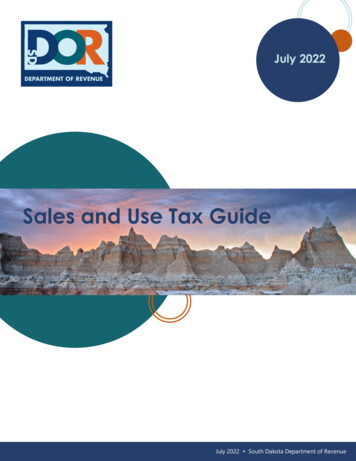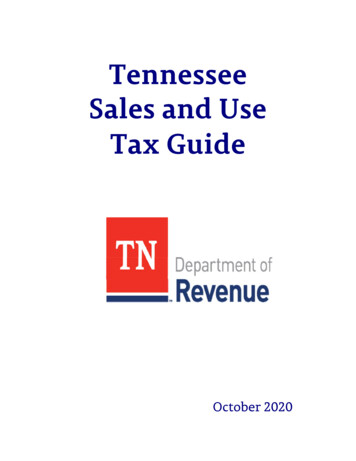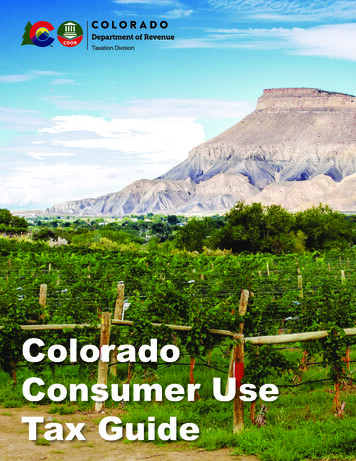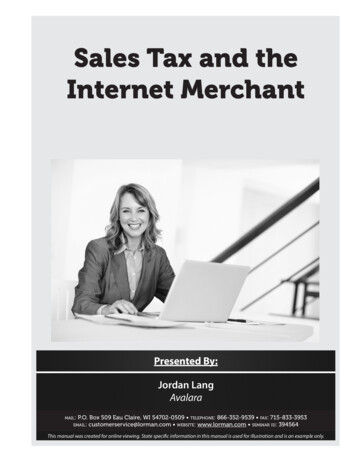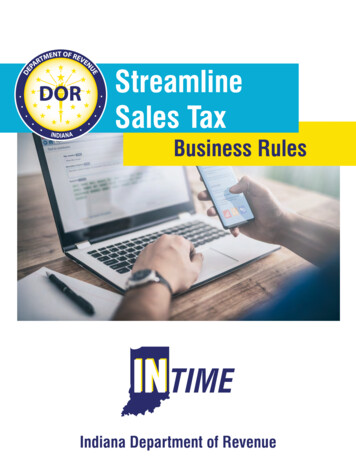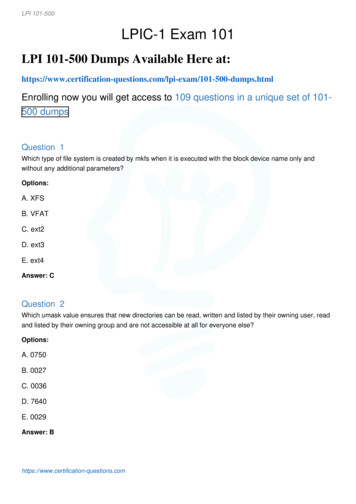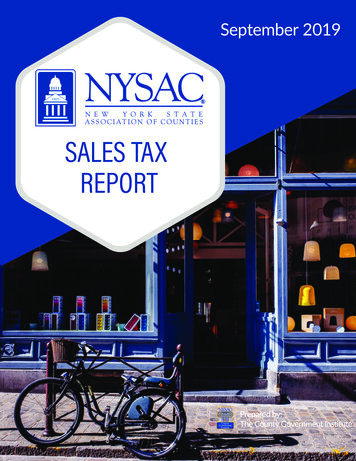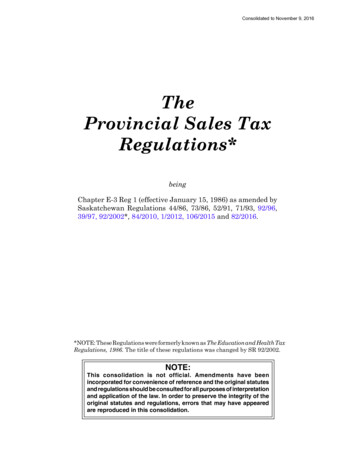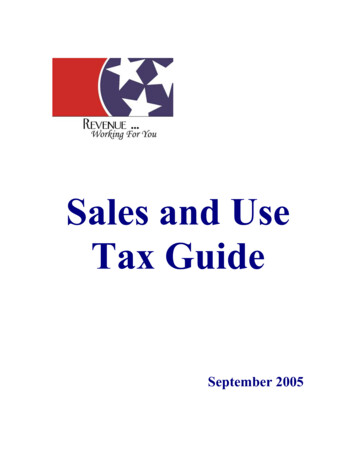
Transcription
Sales and UseTax GuideSeptember 2005
SALES AND USE TAXDear Tennessee Taxpayer,This publication is designed to help taxpayers better understand the Tennessee sales or use tax, includingthe collection and remittance of the tax. The sales or use tax is an essential part of the Tennessee taxstructure. You may find compliance easier when you know more about the tax. Please take time toacquaint yourself with how this tax applies to you. This sales or use tax guide is intended as an informalreference for taxpayers who wish to gain a better understanding of Tennessee sales or use tax requirements.It is not an all-inclusive document. The tax guide is not intended as a substitute for Tennessee sales or usetax statutes or Rules and Regulations, nor is it intended to be a statement of Department of Revenue policy.The information in this guide is current as of the date of publication but could change as the tax laws, theirinterpretation, and their application do change from time to time because of legislative action, reviews, andcourt decisions.Periodically, registered taxpayers are mailed information letters with updates on tax laws and policies. Besure to read any letter you receive carefully; this information may save you time and money. Informationalpublications are also available for specific industries. Contact the Taxpayer Services Division to obtainthese publications.The Department of Revenue offers a toll-free tax information line for Tennessee residents. The number is(800) 342-1003. If calling from Nashville or outside Tennessee, you may call (615) 253-0600. TheDepartment of Revenue also offers a telecommunications device for the deaf (TDD) line at (615) 741-7398.In addition, the Department of Revenue offers a HOT LINE number for the exclusive use of the taxpractitioner. In-state practitioners may call toll-free (800) 397-8395; from Nashville and outside Tennessee,call (615) 253-0700.If you have questions, please do not hesitate to contact any of the offices listed below.Sincerely,Taxpayer Services DivisionTennessee Department of RevenueTaxpayer Services DivisionAndrew Jackson Building, 3rd Floor500 Deaderick StreetNashville, Tennessee 37242-1099Toll-Free: (800) 342-1003Out-of-State: (615) 253-0600TDD: (615) 741-7398Regional OfficesChattanooga:540 McCallie AvenueSuite 350Chattanooga, TN 37402(423) 634-6266Johnson City:204 High Point DriveJohnson City, TN 37601(423) 854-5321Jackson:Lowell Thomas State Office Building225 Dr. Martin L. King Jr. DriveSuite 340Jackson, TN 38301(731) 423-5747Knoxville531 Henley StreetRoom 606Knoxville, TN 37902(865) 594-61001Memphis3150 Appling RoadBartlett, TN 38133(901) 213-1400
SALES AND USE TAXTABLE OF CONTENTSSales or Use Tax5Sales or Use TaxLocal Option Sales or Use TaxWho Must Have a Sales or Use Tax Registration?Who is Liable for Sales Tax?Who is Liable for Use Tax?How to RegisterTennessee RetailersOut-of-state RetailersRevocation of Certificate of RegistrationChanges in Ownership, Address, or BusinessAdditional ReferencesDefinitions556677778889Occasional and Isolated SalesSingle ArticleMotor VehiclesBoatsManufactured HomesState Tax on Purchases of Single ArticleComputing Sales Tax Due on Single ArticlesTangible Personal PropertyFood and Food Ingredients99999991011What Are “Food and Food Ingredients?”Examples of “Food and Food Ingredients”Items Not Taxable at the 6% Food RateCandyDietary SupplementsMeal SubstitutesPrepared Food11111111111212Tax Credits13CreditsSales or Use Tax Paid in Another StateEmerging Industry Credit131313Taxable and Non-taxable Property and ServicesTaxable Tangible Personal PropertyServicesTaxable ServicesNon-taxable Tangible Personal PropertyNon-taxable Services151515151616Exemptions Requiring Certificates17Documenting ExemptionsBlanket Certificate of ResaleGovernment Certificate of ExemptionCertificate of Exemption for Nonprofit OrganizationsCertificate of Exemption for Call CentersExemptions Requiring Documentation171718181819Removal from Tennessee by BuyerExemption for Railroad Track Materials and Locomotive RadiatorsExemption for Electric Cooperatives and MembershipCorporations and Utility DistrictsExemption for Electric Generating and Distribution Systems,Resource Recovered Facilities, or Coal Gasification Plants219191919
SALES AND USE TAXTABLE OF CONTENTSAgricultural Exemptions20Farmers and Nurseries Exemption CertificateAgricultural ExemptionsSales by Farmers and Nursery OperatorsExemptions and Reduced Rates for Qualified ManufacturersIndustrial MachineryIndustrial Machinery AuthorizationPollution Control EquipmentEnergy Fuel and WaterComputersMaterial Handling and Racking Systems EquipmentIndustrial MaterialsNon-manufacturing ExemptionsHeadquarters FacilityFood Service EstablishmentsOther Exemptions from Sales or Use Tax202020212121212121212222222223Aircraft Parts and SuppliesAmusementsAutomobilesCaskets and Burial VaultsDesign ProfessionalsDisplay PropertyEnergyExemptions for Tennessee Sales for Out-of-state Consumer UseFilmsFoodFuelLeased VehiclesMedical Equipment and SuppliesMiscellaneous Nonprofit SalesMotor Vehicles Used by Common CarriersPackagingPollution ControlPreservation of Historic PropertyPublicationsSales in Interstate CommerceSales Tax HolidayTelephone CooperativesTelecommunicationsTransactions Between Parent Companies and Wholly Owned SubsidiariesUsed PropertyVending ItemsWarranty ServicesWatershed DistrictsFlea 727272727272728Flea Market RegistrationSales on Less than Permanent BasisSubmission of Flea Market ReturnsDealers Registering AnnuallyDealers Registering Quarterly or MonthlyPenalty for Late FilingContractors282828282830Contractors as ConsumersLiability for the Sales or Use TaxExemptionsTax on Fabricated Materials303030303
SALES AND USE TAXTABLE OF CONTENTSAsphalt FabricatorsInstallation of Industrial MachineryLump Sum or Unit Price Contracts on Realty in Effect on July 15, 2002Property Owned by the United States GovernmentReturns and Payments3131313233Returns and PaymentElectronic Data Interchange (EDI)Electronic Funds Transfer (EFT)Online FilingMailing DatePenalty and InterestAudits and AssessmentsRight to a ConferenceKeeping Records333334343434353535The Taxpayer Bill of Rights36NOTE: Public Chapter 357, Acts of 2003, the Streamlined Sales Tax Act, which willbecome effective no sooner than July 1, 2007 (Public Chapter 311, Acts of 2005), createssignificant changes the Tennessee sales and use tax and the manner in which the salesand use tax is collected. The Act also will remove certain items from the sales and use taxand subject them instead to an assessment on gross receipts. The Department of Revenueis currently working on guidance to assist taxpayers in the transition to the StreamlinedSales Tax. That information will be available to the taxpayers in the future.4
SALES AND USE TAXSALES OR USE TAX (Tenn. Code Ann. Sections 67-6-102, 202)The sales or use tax is a combination of a statetax (7%) and a local option tax (which variesfrom 1% to 2.75%) imposed by city and/orcounty governments. This tax is generallyapplied to the gross sales of any business,organization, or person engaged in retail sales,including the selling, leasing, or renting oftangible personal property and the selling ofcertain taxable services specified in the law. Inaddition, there is a state single article tax rate of2.75%, which is discussed on page 9. Ann. Section 67-6-217) Sales of property to common carriers for useoutside Tennessee are taxed at the rate of3.75%. (Tenn. Code Ann. Section 67-6-219)When sold to or used by manufacturers, waterwill be taxed at 1%, and gas, electricity, fueloil, and other energy fuels is taxed at a rate of1.5%. (Tenn. Code Ann. Section 67-6-206)Interstate telecommunications services sold tobusinesses are taxed at a rate of 7.5%. (Tenn. Code Ann. Section 67-6-221) Gross receipts from the sale of manufacturedhomes, including accessories, furnishings, anddelivery or installation fees, are taxed at 3.5%,half the current rate of state tax. (Tenn. Code Property of a sole proprietorship that becomesproperty of a corporation as a result ofincorporation of the sole proprietorship is notsubject to tax. (Tenn. Code Ann. Section 67-6-223)Cable television services are taxed at a staterate of 8.25% on all charges of 15.01 27.50. Charges of 27.51 and higher are taxedat the regular state and local sales or use taxrates. (Tenn. Code Ann. Sections 67-6-103(f), 67-Ann. Section 67-6-216) 6-226, 67-6-227)The term “sales price” does not include: Electricity and liquefied gas sold to farmersand nursery operators for production of food,fiber, and horticultural products, and energyfuels sold to nurseries and greenhouses is taxedat the rate of 1.5%. (Tenn. Code Ann. Section 67- The “sales price” of an item of tangible personalproperty is the total amount for which property issold, including the cost of any services that arepart of the sale of the tangible personal property.The tax is imposed on the gross proceeds ofleases and rentals of tangible personal property,the gross charge for taxable services, andthe gross receipts or proceeds of sales ofamusements. For example: A consumer buysfour automobile tires subject to the sales or usetax and is charged a fee for mounting the tires onthe automobile. The fee for mounting the tires isalso subject to the sales or use tax. 6-218)Tangible personal property and taxable servicesspecifically intended for resale or sold to agovernment or sales or use tax-exempt agencyare considered in the gross receipts total, but arenot included in the net taxable total. The 7% state tax rate does not apply to sales offood and food ingredients as defined in thelaw. These items are taxed at a state rate of6%. What constitutes food and foodingredients is addressed on pages 11 and 12.Aviation fuel actually used in the operation ofaircraft motors is taxed at 4.5%. (Tenn. CodeTennessee vendors must indicate in specificways whether customers are paying sales or usetax. If the purchase price of a product includesthe tax, it must be indicated in writing on theinvoice, on a sign posted in the business, or in amanner that is assured to make the customeraware of that fact. (Tenn. Code Ann. Section 67-6-503)Dealer cash discounts allowed on property orservices purchases. Manufacturer rebates areincluded in the tax base.Interest charges on purchases bought on aninstallment plan.Any federal retail excise tax for off-road dieselfuel or any federal excise tax imposed underSections 4051-4053 of the Internal RevenueCode of 1954.The value of items taken as “trade-ins” on thepurchase of similar new or used items. Thetrade-in item must be listed as such, by modeland serial number, where applicable, on thecustomer’s invoice. (Tenn. Code Ann. Section 67-Local Option Sales or Use TaxAny county or incorporated city may levy a taxon the same privileges that are subject to thestate’s sales or use tax; all counties and someincorporated cities have adopted a local optiontax of up to 2.75%. The tax is imposed in thelocality where water and telephone services aredelivered to the consumer or where the dealer ofother tangible personal property or services islocated. (Tenn. Code Ann. Section 67-6-702)6-510)There are some exceptions to the 7% standardstate sales or use tax rate:5
SALES AND USE TAXSALES OR USE TAX (cont’d)conduct business in Tennessee. Business may beconducted by:(Tenn. Code Ann. Sections 67-6-102, 202)The law limits some local option tax rates: There is no local option tax on electric power orenergy, natural or artificial gas, coal, or fuel oil. The tax rate for water sold to manufacturers is0.5%. If the local tax rate is less than 1%, therate for water sold to manufacturers is 0.33%. (Tenn. Code Ann. Section 67-6-702) The tax rate for sales of tangible property tocommon carriers for use outside Tennessee is1.5%. (Tenn. Code Ann. Section 67-6-702)Intrastate telecommunication services aretaxed at the state rate of 7% and a flat 2.5%local tax rate regardless of the local tax ratelevied by the local jurisdiction. (Tenn. Code Ann.Selling, renting, or leasing, even by a transientvendor, any type of tangible personal property.Selling any type of taxable service in the state.Furnishing property or services that are subjectto the sales or use tax.Charging admission, dues, or fees that aresubject to the sales or use tax.Using tangible personal property notpreviously taxed.Selling any item from a vending machine ordevice in which merchandise is provided upondeposit of money, other than certain vendingmachines operated for the benefit of taxexempt organizations, is taxable under thesales or use tax law. A separate registration isrequired for vending sales.This requirement applies whether your businessis a sole proprietorship, partnership, LLC,corporation, or any other type organizationincluding those that are not for profit. Retailersfrom other states that maintain a physicallocation in Tennessee, whether temporary orpermanent, must also hold a Certificate ofRegistration. A business having more than onelocation must hold a certificate for each businesslocation. For example: A clothing business withlocations in two malls must hold a certificate foreach location.Section 67-6-702)Interstate and international telecommunicationservices sold to businesses are subject to thestate tax rate of 7.5% and exempt from localtax. (Tenn. Code Ann. Section 67-6-702)Interstate and international telecommunicationservices sold to persons other than businesses aresubject to a state tax rate of 7% and a flat 1.5%local tax rate regardless of the local tax ratelevied by the local jurisdiction. (Tenn. Code Ann.Dealers having average monthly gross sales of 400 or less and taxable services of 100 or less,may, at the discretion of the commissioner, berequired to pay tax to their suppliers onpurchases in lieu of registering for sales oruse tax purposes. For these taxpayers, thedepartment’s cost of administering the accountwould exceed the taxes reported.Section 67-6-702)Cable television programming and servicesprovided by a cable television provider orwireless cable television provider for publicconsumption are exempt from local tax up to anamount of 27.50. (Tenn. Code Ann. Section 67-6-714)Vending machine sales will be reported on bothfood and non-food items and are taxed at astandard rate of 2.25% local tax on all sales.Who is Liable for Sales Tax? (Tenn. Code Ann.Section s 67-6-501, 502)In Tennessee, the responsibility for sales taxrests on the dealer that provides the taxabletransaction or service. The law requires that thedealer pass the tax to the customer; failure to doso does not relieve the dealer of theresponsibility to timely remit the tax to the state.Who Must Have a Sales or Use TaxRegistration? (Tenn. Code Ann. Sections 67-6102, 201, 211, 602)A person or company wishing to manufacture,distribute, sell, rent, or lease tangible personalproperty, or provide taxable services, in this statemust hold a Certificate of Registration in order toIn the case of a property management companyhired to manage vacation lodging for anindividual property owner, the sales tax will be6
SALES AND USE TAX Consuming or using a product that waspurchased without paying sales or use tax. Consuming, as a service provider, taxableservices or tangible products in theperformance of a service. (Tenn. Code Ann.SALES OR USE TAX (cont’d)(Tenn. Code Ann. Section 67-6-203)(Tenn. Code Ann. Sections 67-6-102, 202)imposed on the gross charge for rental and willbe remitted by the property managementcompany.Section 67-6-316)How to Register (Tenn. Code Ann. Sections 67-6-Tax will be reported and paid each month basedon the gross sales, or purchases, from all taxablesales and purchases during the preceding month.The tax is will be paid on the return for themonth in which the taxable event occurs, even ifthe tax is not collected from the customer duringthat month. For example: A charge sale is madeduring the month of June. The dealer must paythe tax on the June return even though thecustomer may not pay the account until July.601, 602)Tennessee RetailersPerhaps the best method of applying for thecertificate of registration is to register online athttp://www.tennesseeanytime.org/bizreg/. Youmay also visit one of the Department of Revenueoffices listed on the inside front cover of thispublication. Trained personnel are availablethere to explain Tennessee’s tax system andanswer any of your questions.Who is Liable for Use Tax? (Tenn. Code Ann.Section 67-6-203)When a user of tangible personal property doesnot pay sales tax to a dealer, the user becomespersonally liable for the tax. This generallyoccurs when a user purchases articles from anout-of-state dealer not registered for Tennesseetax. It also occurs when a dealer withdrawsinventory items purchased on a resale certificatefor business or personal use. For example: Aclothing store owner purchases clothing on aresale certificate then takes items from inventoryfor personal use. Use tax is then due on thatclothing.Whether registering online, in person, or by mail,you must have the following information tocomplete your application: The use tax rate is equal to the sales tax rateon both the state and local level. Use tax isdue even when a citizen imports tangiblepersonal property into Tennessee for use. Forexample: A business relocating to Tennesseebrings property purchased in a state with no salesor use tax. The dealer would be liable for use taxon this property. (Tenn. Code Ann. Section 67-6-210) Out-of-state RetailersUse tax is normally incurred when: Out-of-state retailers must register with theDepartment of Revenue and obtain a certificateof registration for payment of the sales or use taxif they have a “nexus” in Tennessee. Retailersare considered to have a nexus if they:Purchasing a product in another state withoutpaying sales or use tax and bringing it intoTennessee for use here. (Tenn. Code Ann. Section67-6-210) The name, address, and phone number of thebusiness, all owners, officers, or partners, andthe person making the application.The Social Security Number(s) of theowner(s), partners, or officers.The Federal Employer Identification Number(FEIN) issued by the U.S. Internal RevenueService if you have one.A description of the business, the type ofownership, a brief explanation of the nature ofthe business, and, if the business is acorporation, the date of incorporation.If you have purchased your business, the nameand address of the previous owner.The signature, on the application, of the soleproprietor, a partner, or an officer of acorporation.Purchasing a product from a mail-order catalogor on the Internet and paying no sales or usetax. (Tenn. Code Ann. Section 67-6-210)Purchasing a product from a transient businessthat does not collect sales or use tax. (Tenn. Code Ann. Section 67-6-210)7Have an office, distribution point, sales room,warehouse, or any other temporary orpermanent place of business in Tennessee.Have an agent, salesperson, canvasser, orsolicitor operating in Tennessee for the
SALES AND USE TAXSALES OR USE TAX (cont’d)hearing and be allowed to present evidence as towhy the certificate should not be revoked.(Tenn. Code Ann. Sections 67-6-102, 202) purpose of making sales or taking orders forsales.Furnish any property or services subject to thesales or use tax while in Tennessee.Are the lessors of tangible personal propertylocated in Tennessee.Are construction contractors performing jobsin Tennessee.Have any other physical presence inTennessee.Any person engaging in business as a dealer inTennessee without a certificate of registrationfrom the department is guilty of a Class Cmisdemeanor. (Tenn. Code Ann. Section 67-6-606)Changes in Ownership, Address, or Business(Tenn. Code Ann. Section 67-6-602)You must notify the Department of Revenue ifthe business ownership changes in any manner.This change could be selling or closingthe business, adding or changing partners,transferring or changing the ownership of thebusiness, or changing corporate structurerequiring a new charter or certificate ofauthority. You must also notify the Departmentof Revenue if the business location changes.This requirement applies even though the sale ofthe product or its delivery is in interstatecommerce. For example: An out-of-statecomputer company sells computer systems toTennessee businesses through a salesperson thattravels in this state. This business is required toobtain a certificate of registration and collectsales or use tax on the price of the system.If any of the changes mentioned should occur,answer the questions on the back of thebusiness’s certificate of registration and mail it tothe Department of Revenue. The new owners orofficers, if applicable, must then apply for a newCertificate of Registration.A business having a physical presence inTennessee must collect and remit sales or use taxon all sales whether orders are taken in person,by phone, or by mail.Mail-order companies that do not have a physicalpresence, either permanent or temporary, cannotbe held responsible for collecting and remittingsales or use tax. They can voluntarily register tocollect the tax for their customers. However, ifthey do not collect and remit the sales or use taxto the state, then the consumer is responsiblefor reporting and paying the tax. Use tax is dueon products purchased from companies notregistered to collect the Tennessee sales or usetax.If you sell your business or go out of business,you must make a final sale or use tax return andpay all sales or use tax due within 15 days afterthe date you sold or quit the business. If you soldthe business, the purchaser must apply for acertificate of registration in his or her own name.(Tenn. Code Ann. Section 67-6-513)Additional ReferencesFor additional information, or to view actualdocuments pertaining to Tennessee’s tax laws,we invite you to visit these Internet Web sites:Revocation of Certificate of Registration(Tenn. Code Ann. Sections 67-6-603, 604)Any taxpayer violating the provisions of thesales or use tax law may have the certificate ofregistration revoked by the Commissioner afteran opportunity for a due process hearing hasbeen afforded. If the certificate is revoked, thatperson will not be eligible to apply for anothercertificate for 12 months. The taxpayer isentitled to a hearing with the department todetermine if revocation was justified. Thetaxpayer will receive a 10-day notice of theFor the Tennessee Code, as well as informationor changes to the Sales or Use Tax law, RevenueRulings, Important Notices, Answers toFrequently Asked Questions, and Tax Forms,visit the Department of Revenue’s Web site:http://www.Tennessee.gov/revenue.For tax Rules and Regulations, see the Secretaryof State at www.state.tn.us/sos/rules/rules.htm.8
SALES AND USE TAXDEFINITIONSBoatsOccasional and Isolated Sales (Tenn. Code Ann.Boat motors and any dealer installed accessoriesthat are installed prior to the sale, freight, andlabor, excluding trailers, will be treated as part ofthe boat unit in the same manner as parts andaccessories for motor vehicles are treated. Itemssuch as skis, ski ropes, personal flotationdevices, and similar items are not considered partof the single item. Boat trailers will be taxed as aseparate single item. The state tax rate applies tothe total bill of sale.Section 67-6-102)Occasional and isolated sales, also known ascasual and isolated sales, are sales made bypersons not in the business of regularly sellingthe type of property being sold. These sales arenot subject to tax. Occasional and isolated salesare also sales of tangible property taking placeonly during temporary sales periods of 30 daysor less and occurring no more than twice peryear. For example: The sale of a piece offurniture in a yard sale and the sale of Girl Scoutcookies are both considered occasional andisolated sales.Manufactured HomesParts, accessories, furniture, appliances, andother items that are part of a manufactured homeat the time of sale are treated as parts of thesingle unit for the local tax liability. Alsoincluded as part of the single article price aredelivery fees, installation fees, and otherincidental items that are part of the sale.Installation includes charges made for setup,plumbing hookup, and electrical hookup.Any church or similar organization that regularlysells goods or taxable services is considered adealer by the Department of Revenue and,generally, will be liable for tax on those sales.Sales of motor vehicles, boats, and airplanes arenot considered occasional and isolated sales insales tax law.State Tax on Purchases of Single ArticlesSingle Article (Tenn. Code Ann. Section 67-6702(d))Effective July 15, 2002, an additional state salesor use tax at the rate of 2.75% was enacted onthe portion of the sales price, from 1,600.01 upto and including 3,200, of any single articlesold. This is a state tax only. This portion of thesingle article sales price is not subject to the localtax.The term “single article” refers to any item thatis considered, by common understanding, to be aseparate unit, apart from any accessories, extraparts, etc., that is capable of being sold as anindependent item or as a common unit ofmeasure. Independent units sold in sets, lots,suites, or such groupings, are not considered tobe single articles. The local option tax cannotexceed 2.75% and may be assessed only on thefirst 1,600 of the purchase price of any singleitem of tangible personal property. Someapplications of the “single article” concept are:Computing Sales Tax Due on Single ArticlesAssume that the total sales price, including allassociated charges, of a single article is 20,000.Tax computation would be:(a) The general state sales tax rate of 7% appliesto the total 20,000 sales price. 20,000 x 7% 1,400.Motor VehiclesParts and accessories for motor vehicles that areinstalled at the factory and delivered as originalequipment will be treated as part of the unit.Likewise, parts and accessories that are installedby the dealer or distributor prior to, or at the timeof, sale and are included in the sale price willalso be considered as part of the unit. This alsoapplies to parts or equipment required to beinstalled prior to the sale because of state orfederal law.(b) The local option sales tax applies to the first 1,600 of the sales price. The local option sales taxrate in Davidson County is 2.25%. 1,600 x 2.25% 36.(c) The state single article sales tax applies to thesales price from 1,600.01 up to and including 3,200 (the second 1,600 of the sales price). Thestate single article rate is 2.75%. 1,600 x 2.75% 44.(d)9In this example, the total sales tax is 1,480.
SALES AND USE TAXIf a single article with a total sales price of 20,000 has 5,000 in manufacturer’s rebatesapplied, making the total amount the consumerpays only 15,000, the consumer still owes salesand use tax on the full 20,000 sales price beforeapplication of the rebates. The sales price of 20,000 has not changed, even though theconsumer received a payment break because aportion of the sales price is rebated to the dealerby the manufacturer.If a consumer purchases an extended warrantyplan on a single article, the warranty plan is alsotaxable, and tax must be computed separately onthe single article and the warranty. This couldincrease the amount of tax due from theconsumer. And, because an extended warrantycontract does not qualify as a single article oftangible personal property, the local option taxrate would apply to the entire purchase price,even if it exceeded 1,600. There would be nostate single article tax application to the costprice of the warranty contract.Tangible Personal Property (Tenn. Code Ann.Sections 67-6-102, 212)Tangible personal property is defined as propertythat may be seen, weighed, touched, felt, or isperceptible to the senses in any other manner.Prepaid telephone calling cards and authorizationnumbers are considered tangible personalproperty. Computer software is also consideredto be tangible personal property. Tangiblepersonal property does not include stocks, bonds,notes, insurance, and other securities. It does notinclude signals broadcast over the airwaves. Italso does not include utility poles, anchors, guys,and conduits, which are considered to be realproperty.10
SALES AND USE TAXFOOD AND FOOD INGREDIENTS(Tenn. Code Ann. Section 67-6-228)roasted or coated nuts, marshmallows, partytrays, vitamins, and minerals.Although the general sales or use tax rateincreased on July 15, 2002, sales tax lawprovides that sales of food and food ingredientsremain subject to a state rate of 6% plus theapplicable local tax rate.Items not Taxable at the 6% Food RateCandy“Candy” is defined as a preparation of sugar,honey, or other natural or artificial sweeteners incombination with chocolate, fruit, nuts, or otheringredients or flavorings in the form of bars,drops, or pieces. Candy does not include anypreparation containing flour and must require norefrigeration. If an item requires refrigeration orhas the word “flour” as an ingredient on thelabel, it is not candy.What Are “Food or Food Ingredients?”In specifying that food and food ingredientsremains at the 6% state rate, the law defines“food and food ingredients” to mean“substances, whether in liquid, concentrated,solid, frozen, dried, or dehydrated form, that aresold for ingestion or chewing by humans and areconsumed for their taste or nutritional value.”Examples of items that are considered to becandy (the list is not all-inclusive) are breathmints; candy bars; chocolate chips; fruit roll-ups;marshmallows; caramel corn; caramel apples;chocolate- or carob-covered raisins or nuts;sweet or semi-sweet cooking bars or chips; gum;honey roasted or beer nuts; trail mix thatincludes candy; peanut brittle; sugarless candy;and yogurt-covered raisins or nuts.The law also specifies that the 6% rate does notapply to cand
SALES AND USE TAX 5 SALES OR USE TAX (Tenn. Code Ann. Sections 67-6-102, 202) The sales or use tax is a combination of a state tax (7%) and a local option tax (which varies from 1% to 2.75%) imposed by city and/or county governments. This tax is generally applied to the gross sales of any business, organization, or person engaged in retail sales,
